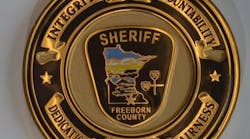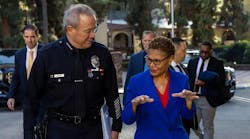On of my esteemed colleagues at Officer.com is Val Van Brocklin. I had the distinct pleasure of meeting and visiting with her at the recent international ILEETA conference in Chicago. She is awesome and one incredibly powerful communicator.
Val has written a series of articles for Officer.com on the topic of Training Cops to Lie. This is an issue which drew my interest because my life has been directly affected by it. I called Val to suggest some ideas which she might want to include in her ongoing series. After all, I judge that she has taken some ownership of the subject.
She was quick to point out that she has intentionally stayed on one side of the line and written only about the use of police deception when it is either sanctioned or specifically authorized in the investigation of criminal activity. We agreed: she will write about the legal and ethical use of deception while I will explore the other side.
Cops learn very early that lying is an essential part of survival, self-preservation and self defense. However, some cops don't know where to stop. Although lying is not officially accepted behavior, in reality it is tacitly approved by our leaders and seasoned officers. There is enormous peer pressure to conform.
Ours is a battle-hardened band of brothers. Nearly every cop is a superb example of humanity, but some cops cannot seem to find the line. They end up on a slippery slope, with their lives and careers sliding into a cesspool of ethical failure. Worse, they call on their brothers to conceal and protect them from scrutiny or incrimination.
With one's entrance into the world of law enforcement, a rookie quickly learns about the unique culture. If you doubt me, spend a few hours at an academy when it is early on in the training process. Rookies learn to take orders, deal with multiple demands, handle superiors who are ill-mannered ways and keep their mouths shut, except with an occasional "Yes Sir!" as their only response.
They learn the hard way of the importance of sticking together and having each others' backs. One of the earliest lessons that I remember from my academy was the instructor saying, "Never burn a cop and never burn a cop's family." He went on to explain that cops are bound together in a single unit and it is morally wrong to ever turn against a brother officer.
The setting is important. I was in the first weeks of training. The instructor was an authority figure whom I had come to respect. He made that statement and wasn't open to debate. It was stated as fact, with no room for challenge. Though not very young, I was impressionable, and I took the message to heart.
Our training continued. In other classes, we saw videos. We went to the gym to learn and practice defensive tactics. We learned about weapons and went to the range. All put together, we were getting a very practical understanding of the use of force and the risks that lie ahead.
About midway through the academy experience, one of the instructors expounded on the duty we take on as part of our oath as a cop. In the battlefields of the streets, "Never leave a brother behind." The instructor continued, "When you put on the badge, you proclaim your willingness to give your life without hesitation to save a brother cop. If you are not fully prepared to do that, NOW is the time to leave. Do not live a lie. Do not pin on the badge if you don't really intend to rise to meet the obligations of the duty it implies."
I was profoundly struck by those words. The concept enveloped me. Over the next days I talked with my wife about it. I prayed about it. I considered what it truly meant for me to ensure that I was ready. As I look back, these were many of the same feelings I had before asking my wife of 38 years to marry me. This would change everything. I had to be ready, or I had to quit. I remained and have never looked back or regretted it for a moment.
One day, class finished early. My partner (we shared a table in class) suggested that we stop for a beer, because we suddenly had extra time when our wives were not expecting us home. One beer became a few and as we left the tavern, Mike said, "Let's tell our wives we just had one beer. They won't know the difference." I readily agreed.
That seemingly unimportant event became a watershed moment for me. It was then that I came to this realization: cops get to write their own stories, create their own facts and make their own history with little risk they will ever be found out. I suddenly felt as though I had been given a super power.
Where Is The Line?
Skipping ahead a short time, I was called in for an oral board interview by an agency where I had applied. It was my first oral board. I was really nervous because of the horror stories I had heard from others. There were three officers seated at a table. All of them were focused on me. I could feel myself sweating. Then came the first tough question.
"You are a rookie cop working with a seasoned veteran on a midnight shift. At 3:00AM, dispatch sends you to a convenience store in response to an alarm. You find the front glass window broken out. You and your partner secure the scene and find no one. You advise dispatch. You are told that the key-holder is 30 minutes away. While waiting his arrival, your partner takes a small package of gum (worth maybe a quarter) and puts a stick in his mouth. The remainder goes in his pocket. He does not put any money down. What are you going to do, as a rookie?"
I respond saying that based on the totality of the circumstances, I will do nothing.
Question #2
"It is a week later. You are working the same shift with the same partner. At 4:00AM, you come upon an abandoned vehicle that is partially blocking the road. You run the tag and everything comes back clear, but there is no driver to be found so you advise dispatch to send a wrecker. Your partner offers to write the tow sheet. As he is doing the inventory of the vehicle, you see him pick up a $20 bill from the front seat and put it in his pocket. Now, rookie, what are you going to do?" they ask.
I was really sweating now. I told them that I would take a $20 from my pocket and put it on the seat in the subject vehicle. I went on to say that I would tell my partner that he had put me in a most compromising position and should he ever do anything like that again, he will leave me with no choice but to report his actions to the shift sergeant.
Question #3
"Same partner, same shift. Dispatch sends you to the scene of a car wreck. The at-fault driver sped off. On arrival, you see that the remaining vehicle is damaged and the driver is injured. While the injury is not life-threatening, this person will need to be transported for further medical care. You take the necessary information and begin checking the area for a vehicle that matches the victim's description of the one that sped away from the scene."
"After a short while, you and your partner find the suspect vehicle. It is parked in the driveway of your chief and it is his personal vehicle. It has damage consistent with the crash you just investigated. The senior officer wants to report that you were unable to locate the at-fault vehicle. What are you going to do?"
I had to think about that for a moment, though it seemed like an hour at the time. I told the board that I would respond by saying that I would not go along with the story. I intended to tell the truth in my report. In addition, at the first opportunity, I would advise the sergeant of what had happened.
In reflection, it was clear that this panel was using hypothetical situations to test me. Did I use good judgment to establish a reasonable course of action in each case? Did I understand the idea that there is a line which should not be crossed? Did I know how and where to place that line?
The Tests of the Real World Would Come Later
In my early days on the street, while I was still in the FTO phase, I remember encountering a slug whom every cop in the department had handled at one time, or another. He became verbally abusive and then passively resistant when I attempted to pat him down for weapons. Without much hesitation, my partner went hands on to insure that passive resistance wouldn't become aggressive resistance.
Realizing that we wouldn't play his game brought out this guy's more compliant side. When it was all said and done, my partner turned to me and said, "Let's get our story straight. You saw him take a swing at me, didn't you? That's why I had to put my hands on him." My reply was a simple, "Sure did."
Every cop has a multitude of experiences just like these. They come in waves. Sometimes, determining the right course of action is absolutely, positively, crystal clear. Other times, not so much. The ethical dilemma can be as murky as the water in the Gulf of Mexico after the BP oil spill.
Cops don't have the luxury of time like most jobs. We cannot take time to ponder the potential outcomes of various approaches. We must make decisions in a split second, in situations that are rapidly evolving and with the urgency of being embattled while trying to save our own life or the life of another.
Where Is The Line?
Each of us makes these decisions frequently. They nearly become intuitive and are often driven by instinct. Sometimes, lying is OK. No one gets hurt. No one goes to jail. None of the Ten Commandments were violated.
Imagine this situation: You accompany your wife on a clothes shopping trip. She emerges from the fitting room at her favorite store wearing a new dress. You can discern from her facial expression and mood that she has already decided that she wants to buy it. As she twirls in front of the mirror, she asks you, "Does this outfit make me look fat?"
You offer an absolutely truthful answer. "No, your butt makes you look fat. The dress has nothing to do with it."
Telling the God's honest truth is not always the best choice.
I remember one morning when my wife grilled me about my activities on the previous evening. I insisted that I had been in class at school. She was suspicious, but I maintained my position and told her that she could call my partner to corroborate my story. It was then that she laid it on me, "Why would I call him? You guys lie for one another all the time." I'd been had. (It didn't help when she found the receipt from Hooters in my pocket, either.)
Oh well. No harm, no foul.
End of Part One
It the next segment, I will discuss institutionally-driven lying. "Any means to the end," frequently seems to be the message from those above us on the food chain.
As I researched this topic, I discussed it with a clinical psychologist. I learned, with some surprise, that some folks do not have a moral compass. It never occurs to them to measure their actions against an ethical yardstick. They just go through life in a state of constant oblivion about core values. Instead, they operate based on what they have been taught to do with no understanding of why a certain behavior is appropriate.
That information was a profound surprise to me.
The reality is that the line moves based on the situation and all of the surrounding circumstances. An action that is right today could well be wrong tomorrow. If you are not paying close attention, over time, you can find yourself up to your neck in fecal matter - losing your career, your integrity, your honor and your respectability.
For some, the small first lie can put a cop on a slippery slope to ruination. It is important that I constantly evaluate where my actions place me on that ethical yardstick. I have come to trust my gut instincts. I work hard to discern God's will when I feel uncertain. I endeavor to stay plugged into the values that I was taught as a child.
I am far from perfect and I often fall short. I judge that other people are often much better than I am. Yet, I keep trying and striving to meet the goals that I have set for myself as well as rising to the expectations of those who depend on and respect me. To quote my Dad, "Just do your best. No one can ask more."
The goal remains to save just ONE life - literally or figuratively. Yours may be the ONE.


